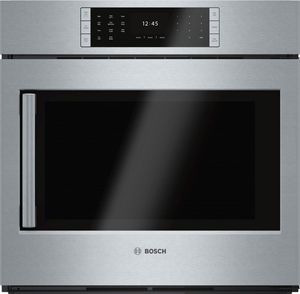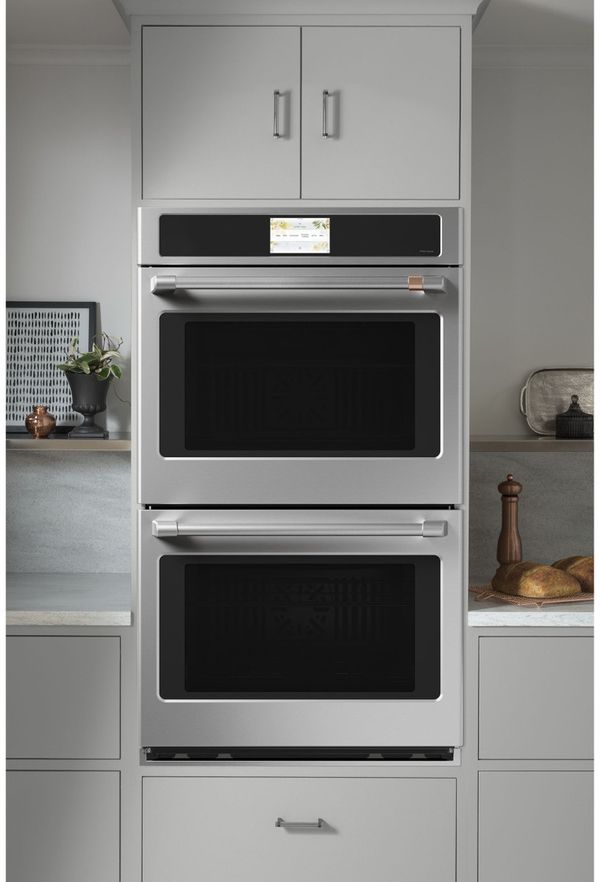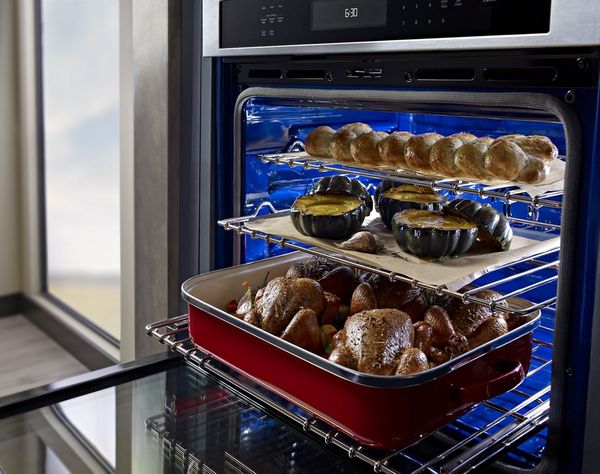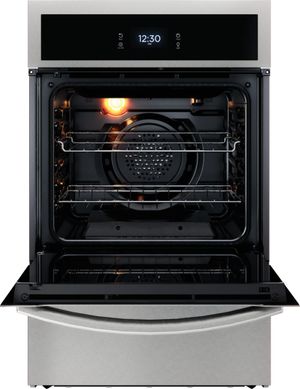
At a Glance
Gas vs. Electric: Key Differences
Top Electric and Gas Ovens to Upgrade Your Kitchen
Choosing between a gas and electric oven is not an easy decision, especially if you love cooking, baking, or spend a lot of time in the kitchen.
Like everything else in life, each type of oven comes with its own set of benefits and drawbacks. This makes it important to consider your specific needs, preferences, and cooking habits while you are shopping for your new appliance.
In this blog, we’ll dive into four of the key differences between gas and electric ovens—performance, efficiency, cost, and versatility—so you can confidently decide which type of oven is the best fit for your home.
Gas vs. Electric: Find the Best Fit
Not sure if a gas or electric oven suits your cooking style? Learn about the differences and visit Texas Appliance for the best selection.
Shop OvensGas Ovens: A Brief Overview
Gas ovens have been a staple in many kitchens for years for a reason. Gas ovens are known for their quick response times and ability to reach high temperatures quickly.
Powered by natural gas or propane, these ovens offer superior control over heat, allowing for more precise cooking. One of the biggest advantages of gas ovens is that the temperature immediately decreases when you turn the heat down, which is especially useful when you need to lower the heat fast to avoid burning or overcooking food.
Gas ovens are also praised for their ability to create a moist cooking environment. The combustion process in a gas oven produces a bit of moisture, which can be a game-changer when baking items that can dry out easily, like bread and cakes.
This makes gas ovens an excellent choice for anyone who enjoys baking and roasting at home.
Pros and Cons of Gas Ovens
Explore the main benefits and drawbacks to decide if a gas oven is right for you.
✅ Pros
- Instant Heat Control: Temperature adjustments happen almost immediately.
- Moist Heat: Great for baking due to the natural moisture created.
- Energy Efficiency: Gas is generally cheaper than electricity in most regions.
❎ Cons
- Uneven Heating: Less consistent than electric models.
- Installation: Requires a gas hookup, leading to higher costs.
- Fewer Design Options: Limited styles may not fit all kitchens.
Electric Ovens: A Brief Overview
Electric ovens have seen a rise in popularity due to their consistent heat and ability to cook food evenly.
Unlike gas ovens, electric models rely on electricity to heat their elements, which allows for more precise temperature regulation. Another appealing thing about electric ovens is they generally offer a wider range of design and versatility, making them a go-to choice for modern kitchens.
One standout feature of electric ovens is that they are excellent for baking. The even, dry heat provided by the electric elements helps dishes cook uniformly, which is ideal for delicate pastries or large casseroles that need steady heat.
Additionally, electric ovens tend to come with advanced features such as convection fans, digital touchpads, and pre-set cooking modes, providing extra convenience and customization.
Pros and Cons of Electric Ovens
We break down the pros and cons of electric ovens, ensuring you have all the information you need.
✅ Pros
- Even Heat Distribution: Perfect for baking, roasting, and slow cooking.
- Design Flexibility: More models with a variety of designs and sizes.
- Extra Features: Often come with smart features like timers, self-cleaning, and convection settings.
❎ Cons
- Slower Heat Response: Takes longer to heat up and cool down compared to gas ovens.
- Higher Operating Costs: May cost more to run depending on electricity rates.
- Outages: Cannot be used during power outages, unlike gas models.
Gas vs. Electric: Key Differences
Both gas and electric ovens have their individual strengths, but the best choice for you ultimately depends on what you want and need most in an appliance. Let’s dive into the key differences between these two oven types.
1. Performance
When it comes to performance, both gas and electric ovens have their advantages.
Gas ovens excel at heating quickly and accurately. Because they heat up quickly and respond to adjustments almost instantaneously, they’re a favorite among those who need precision. The ability to create moist heat is also a big plus for roasting and baking as it can keep food from drying out.
On the other hand, electric ovens are known for their consistent, even heat. If you’re into baking cookies, cakes, or pies, the dry, steady heat of an electric oven is perfect for ensuring everything cooks evenly. Electric ovens are also better at maintaining lower temperatures, making them ideal for slow-cooked dishes.
2. Efficiency and Energy Consumption
When it comes to efficiency there are two things to consider, both the energy consumption of the oven and how effectively the oven converts energy into heat.
Gas ovens tend to be more energy-efficient because natural gas is often cheaper than electricity. They also lose less heat during operation, which means you’re not wasting energy. However, gas ovens may not distribute heat as evenly, so you may end up using more energy to get the same cooking result.
Electric ovens, while potentially more expensive to operate due to higher electricity costs, are more efficient when it comes to distributing heat evenly. With modern electric ovens, you also have energy-saving features like fast preheat and convection, which can cut down cooking time and energy use.
3. Cost and Installation
The upfront cost of a gas vs. electric oven depends on several factors, including the brand, features, and whether or not you need additional installation services.
Gas ovens generally have higher installation costs because of the need for a gas line or propane connection. However, once installed, gas ovens typically have lower operational costs because natural gas is less expensive than electricity in many areas. Gas ovens also tend to have fewer high-tech features, which keeps their prices relatively affordable.
On the other hand, since most homes already have electrical outlets, installing electric ovens is often easier. The models themselves may be pricier, especially if they come with added features like convection or self-cleaning. And depending on your electricity rates, the cost to run an electric oven can add up over time.
4. Versatility and Design Options
If you’re looking for an oven that blends seamlessly with your kitchen design, electric ovens offer more flexibility. Electric ovens don't require a gas connection, allowing for installation in various locations, including wall-mounted designs. They also tend to come in a broader range of sizes, colors, and styles, making them a great option if design and aesthetics are important to you.
Gas ovens tend to be more traditional in their designs and features. Freestanding or slide-in models are often the only options for gas models. While this might suit classic kitchens, it could restrict your design options if you’re aiming for a modern or minimalist aesthetic.
→ Learn More: 4 Best Reviewed Brands for Double Wall Ovens
Top Electric and Gas Ovens to Upgrade Your Kitchen
Now that you know the key differences between gas and electric ovens, let’s look at a few top-performing models available at Texas Appliance. Each offers a unique combination of features to help you find the best match for your cooking needs.
Bosch Benchmark Series 30” Stainless Steel Electric Built-In Single Oven
Model #: (HBLP451RUC)

Shop Bosch 30" Electric Built In Single Oven
Bosch is known for its high-end kitchen appliances, and this electric oven is no exception. With 4.6 cubic feet of cooking space, it offers plenty of room for cooking large meals.
The sleek stainless steel design complements any modern kitchen, while features like self-cleaning and Home Connect (Wi-Fi control) add an extra level of convenience.
If you're serious about baking or cooking multiple dishes at once, this Bosch electric oven is a fantastic choice.
Café Professional 30” Stainless Steel Electric Built-In Double Oven
Model #: (CTD70DP2NS1)

Shop Café Professional 30" Stainless Steel Electric Built In Double Oven
The Café Double Oven offers the perfect mix of luxury and functionality. It boasts tons of oven space split between two ovens, perfect for multitasking in the kitchen.
The convection bake and broil options ensure even heat distribution, while the Wi-Fi Connect option allows you to control the oven remotely.
Its True European Convection and Precision Cooking modes are ideal for bakers and home chefs alike.
KitchenAid 30” Stainless Steel Electric Built-In Double Oven
Model #: (KODE300ESS)

Shop KitchenAid 30" Electric Built In Double Oven
Experience high-end cooking power and a spacious interior with this KitchenAid double oven.
The Even-Heat™ True Convection system ensures your dishes come out perfectly cooked every time, while the self-cleaning cycle takes the hassle out of oven maintenance.
The satin-glide rack makes loading and unloading large or heavy dishes easy. With its stainless steel finish and multiple cooking modes, this electric oven is both versatile and reliable.
→ Learn More: KitchenAid Double Ovens Reviewed
Frigidaire Gallery 24” Single Gas Wall Oven
Model #: (GCWG2438AF)

Shop Frigidaire 24'' Single Gas Wall Oven
If you’re in the market for a gas oven, the Frigidaire Gallery stands out as a reliable and high-quality choice, offering excellent performance and modern features.
Despite its compact size, it offers plenty of cooking space, making it ideal for small to medium-sized households. It features self-cleaning cycles, convection baking, and broiling capabilities.
The sleek design, along with touch controls and a stainless-steel finish, make this Frigidaire gas oven a great fit for any type of kitchen that prioritizes space-saving solutions.
Gas vs. Electric Ovens: Find the Perfect Fit for Your Kitchen at Texas Appliance
When it comes to choosing between a gas and electric oven, there’s no one-size-fits-all answer.
A gas oven might be your best bet if you value precise temperature control and lower energy costs. On the other hand, an electric oven could be the perfect fit for your kitchen if you prioritize even cooking, modern features, and design versatility.
At Texas Appliance, we offer a wide range of both gas and electric ovens to suit every style, budget, and cooking preference. Take a look at our website to find the ideal oven for your home.
Ready to upgrade your kitchen? Visit Texas Appliance today for the best deals on high-performance ovens!
→ Learn More: The 5 Best Wall Oven Microwave Combos for Your Kitchen
FAQ
Here are some frequently asked questions about gas and electric ovens:
What are the main differences between gas and electric ovens?
Gas ovens typically offer quicker heat response and precise temperature control, while electric ovens provide more even cooking and a wider range of design options.
Which is more energy-efficient, a gas or electric oven?
Gas ovens are generally more energy-efficient and may have lower operating costs, especially if you have access to natural gas. Electric ovens, however, may cost more to operate depending on electricity rates.
Which oven is better for even cooking—gas or electric?
Electric ovens are often better for even cooking, as they distribute heat more consistently throughout the oven cavity compared to gas models.
Where is the best place to buy a gas or electric oven?
For the best selection of gas and electric ovens, shop at Texas Appliance. We offer a wide range of high-quality models to suit every kitchen style and cooking need. Our expert team is ready to help you find the perfect oven at the best price.
Why Trust Texas Appliance?
With roots back to the 1950s,Texas Appliance is an established, locally owned and operated, residential major appliance retailer serving both residential and builders’ needs. Our 4 locations allow us to offer a full spectrum of appliances to meet your every need. With over 40 major quality brands, Texas Appliance has one of the largest displays of built–in and free–standing appliances in the state of Texas.
We will be the best appliance dealer in our markets by exceeding our customers' expectations in every way. We will treat our customers, vendors and fellow employees with respect, honesty, integrity and appreciation. The difference between a "Good" company and a "Great" company lies in its' employees' determination.
Shop Gas Ovens & Electric Ovens at Texas Appliance
Stop by Texas Appliance’s Fort Worth Store and Outlet locations to see what a difference buying local with an experienced staff can make. Or shop wall ovens online! Our friendly experts are always happy to help you find the best gas or electric ovens for your kitchen — whether you call us at 817-299-2800, use our online chat feature, or visit us in person.

